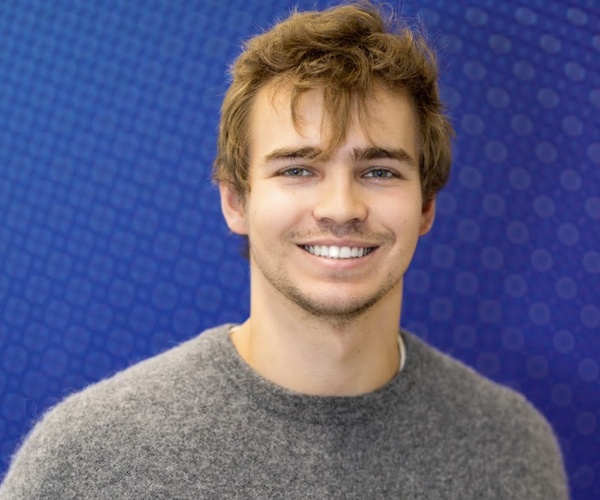When Ben Gardiner (CAS’25) was interning at a mid-sized tech company, he witnessed firsthand a problem that plagues modern hiring: a single job posting attracted thousands of applications over a weekend, leaving his hiring manager overwhelmed with the impossible task of reviewing them all.
“The way we hire is a little broken,” Ben explains. “Three or four thousand applicants had applied to the job. And it was just my hiring manager that had to go through all the resumes.”
This experience, coupled with his own frustrations as a job applicant sending resumes into what felt like a “black box,” inspired Ben to develop Talentora, an AI-powered platform that uses intelligent agents to conduct preliminary interviews with candidates.
“As a student that’s applying for jobs, I would get really frustrated when I just throw my resume into a black box,” Ben shares. “I would love to be able to conduct a short interview for every role I apply to, just to voice my opinions and really share my skills.”
Originally from New Jersey, Ben came to Boston University to study computer science and economics but later switched to data science and finance, drawn by the new program and facilities. This academic background, combined with his internship experiences at software companies, provided the foundation for his entrepreneurial venture.
Talentora, which began as “Robo Recruiter,” uses AI agents to interview candidates and sort the most promising responses for human recruiters and hiring managers to review. The platform aims to create a more efficient and fair hiring process while giving candidates the opportunity to showcase their abilities beyond what’s written on their resumes.
Currently in the beta testing phase, Talentora is working with several customers including Red Hat, PTC, and an HR consulting company. Ben and his team are focused on improving their evaluation algorithms and refining the platform based on user feedback.
The journey from concept to beta product was made possible through Boston University’s innovation ecosystem. Ben is part of the Innovation Pathway at Innovate@BU, where he advanced to the Run stage and received coaching from Ian. However, his primary support has come from Spark!, where he found both teammates and mentorship.
“Spark! has been amazing,” Ben says. “I went to Spark!, spoke to Ziba, spoke to Asad, and we put together a team of five other engineers that were excited by the idea. So they were the catalyst for the project.”
The Spark! team helped Ben assemble a group of computer science students and designers to build the platform. They also connected him with mentors who had valuable expertise in HR technology and enterprise software development.
“One mentor had great background in the HR tech space, which is what we’re building. So she knew a lot about the legal landscape, the requirements,” Ben explains. “And then Aora, who runs Launch Lab, has been a great resource as well because he builds really complicated enterprise software.”
Beyond providing guidance, Spark! offers practical support through the Launch Lab incubator program and stipends that help cover the costs of developing AI-powered software, which Ben notes can be expensive to run.
As graduation approaches, Ben is weighing the future of Talentora. While he plans to start a full-time job after graduation, he’s open to continuing the project part-time, with the possibility of scaling up if they secure paying customers.
In addition to Talentora, Ben is involved in launching the Genesis Fund, a student-led venture fund investing in student startups across Boston-area universities including Northeastern, Babson, and Harvard.
For Ben, the mentorship and resources provided by Boston University’s innovation programs have been invaluable in bringing his ideas to life. As he prepares to graduate, his work exemplifies how students can leverage university resources to address real-world problems while developing entrepreneurial skills.




